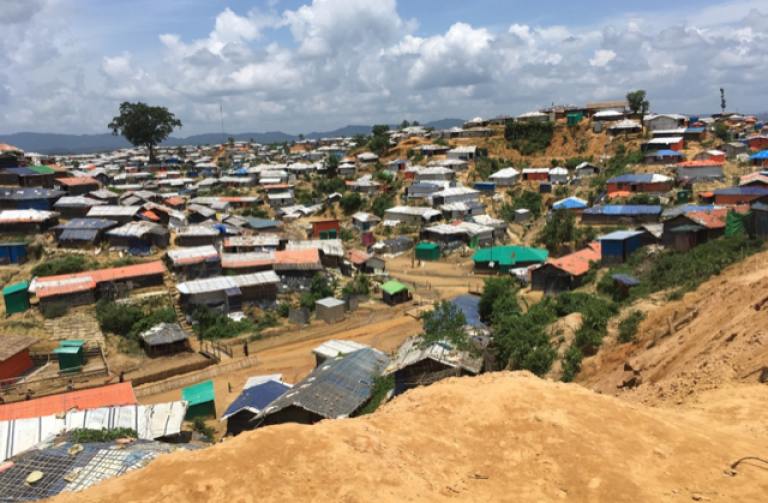Harmful myths about migration and health used to justify exclusion policies
7 December 2018
UCL Institute for Risk & Disaster Reduction contributed to a commission that finds that harmful, unfounded myths about migration and health have become accepted and used to justify policies of exclusion.

Public health protection and cost savings are often used as reasons to restrict migrants’ access to health care, or to deny them entry. Yet, as the new UCL-Lancet Commission on Migration and Health has laid out with new international data and analysis, the most common myths about migration and health are not supported by the available evidence and ignore the important contribution of migration to global economies.
Academics say the normalisation of these myths in popular discourse has allowed governments to introduce hostile and restrictive policies in many countries around the world – including the detention of migrants at US borders, and the denial of treatment to migrants in the UK’s NHS.
Professor Peter Sammonds (UCL Institute for Risk & Disaster Reduction) acted as a commissioner, and was involved in discussions over many different parts of the report. UCL IRDR contributed to the section on 'Composition of mobile populations’, and to the sub-section on 'Climate change refugees’. By using different and more detailed analysis, the Commission found that internal migration caused by flooding, erosion, cyclones, storm surges, drought and groundwater depletion would actually exceed the World Bank’s projection.
The majority of disaster deaths occur in fragile and conflict-affected states where disaster risk reduction (DRR) strategies are almost absent. It is essential for areas at a high risk of natural disasters to develop strong DRR actions to mitigate future potential hazards and minimise life loss, as was found in the case study of Rohingya refugee camps in Bangladesh during a disaster scenario simulation.
“Climate change and natural hazard risks have the potential to force millions of people to migrate in the next 30 years. But globally, migration can be beneficial to both migrants and host populations, so it is important to start developing health systems now which integrate migrant health care with the host populations as this would benefit all," said Professor Sammonds.
In 2018, there were more than one billion people on the move, a quarter of whom were migrants crossing international borders. The Migration and Health Commission is the result of a two-year project led by 20 leading experts from 13 countries, and includes new data analysis, with two original research papers, and represents the most comprehensive review of the available evidence to date.
The Commission will continue to address migration as a global health priority and propose recommendations for increasing access to healthcare and maximising the health of all people on the move.
The Commission was led and co-authored by a Steering Group at UCL: Professor Ibrahim Abubakar, Dr Rob Aldridge (Institute of Health Informatics), Dr Delan Devakumar (UCL Institute for Global Health), Ms Rachel Burns (Institute of Health Informatics) and Dr Miriam Orcutt (UCL Institute for Global Heath). Full findings (which include two original research papers) were also co-authored by academics from UCL: Professor Davide Mosca (UCL Institute for Global Health), Professor Nora Groce (Leonard Cheshire Chair of Disability and Inclusive Development and Institute of Epidemiology & Health) and Professor Peter Sammonds (UCL Institute for Risk and Disaster Reduction). Further UCL contributing authors included: Dr Ayesha Ahmad (Honorary Lecturer (UCL Institute for Global Health), Dr Bayes Ahmed (UCL Institute for Risk and Disaster Reduction), Dr Ilan Kelman (UCL Institute for Risk and Disaster Reduction and UCL Institute for Global Health),
The report will be presented on 8th December at a side event to the UN Intergovernmental Conference to adopt the Global Compact for Safe, Orderly and Regular Migration in Marrakech.
Links
- Professor Ibrahim Abubakar's academic profile
- Dr Miriam Orcutt's academic profile
- Professor Peter Sammond’s academic profile
- Dr Ilan Kelman’s academic profile
- Dr Bayes Ahmed’s academic profile
- UCL Institute for Global Health
- UCL Institute for Risk and Disaster Reduction
- UCL Institute of Health Informatics
- UCL-Lancet Commission on Migration and Health
Image
Credit: UCL IRDR
Media Contact
Rowan Walker
Tel: +44 (0)20 3108 8515
Email: rowan.walker [at] ucl.ac.uk
 Close
Close

